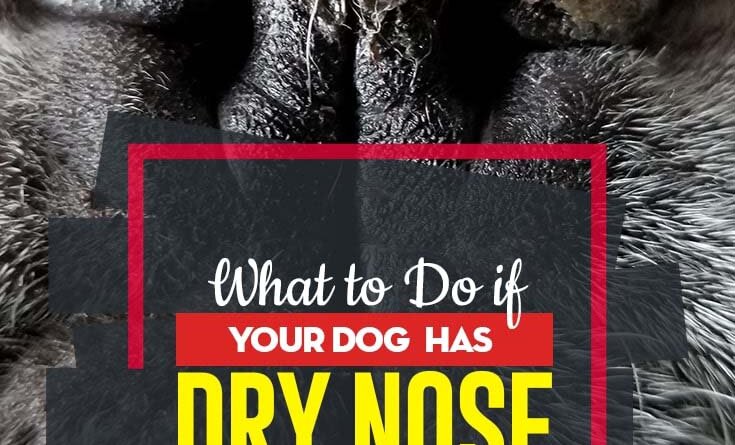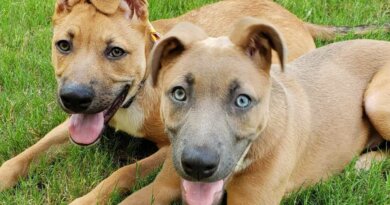What to Do If Your Dog Has Dry Nose – Top Dog Tips
A healthy dog’s nose is naturally moist and cold but does a dog with a dry nose mean that your pet is sick?
There are many factors that contribute to why your dog’s nose can be wet and moist.
But there are also misconceptions about a dog’s dry nose that generally sends owners worrying.
You might have heard the old wives’ tale that dogs with dry noses are likely sick.
But in reality, the moisture level and temperature of your dog’s body fluctuates every day, just like in humans, so dry nose isn’t always a good fever indicator.
A healthy dog can have a dry nose.
On the other hand, a dog’s dry nose can be a cause for concern if the pet is actually feeling sick and warm.
If he’s showing signs of a cough or cold, or if he’s licking his nose too much as a result, then a trip to the veterinarian might be necessary to get a proper diagnosis.
Serious Causes of Dry Nose in Dogs
The most common causes of dry nose in dogs are dehydration, allergies, and sunburn.
But if the dry nose results in cracks or flakes then your vet might require further tests to determine if he has other conditions like an autoimmune disease (pemphigus or lupus) or an illness known as hyperkeratosis.
Allergies
Allergies can unfortunately be the main reason your dog’s nose is dry.
Dogs can be allergic to certain plants, or even pesticides in the grass.
If your dog’s nose becomes dry, try to reflect on what was the most recent activity or environment they were exposed to.
Dehydration
During the heat of the summer your dog if not drinking plenty of water can get dehydrated.
Just like cold dry air, dehydration can cause your dog’s nose to become dry.
Fortunately, this shouldn’t happen, but if it does it can be quick to fix.
Sunburn
Dog breeds who are among the hairless breeds and even some short coats can get sunburned easily.
You know how you forgot to wear sunscreen and you get burned and then your skin gets dry, itchy, and peels? Well your dog’s skin and nose react the same exact way to sunburn.
So if your dog spent too much time in the sun and got burned it can cause them to get a dry nose.
Pemphigus
Pemphigus is a type of skin disease that affects dogs and cats in their middle age.
It can lead to crusting on the face, nose, and ears and may cause the paws to thicken and crack.
This develops because of the dog’s lowered immune system against foreign bodies that normally attack due to his diet and his environment.
Fortunately, pemphigus doesn’t impact other organs in his body.
Lupus
Lupus in dogs, also known as discoid lupus erythematosus (DLE), can be benign if it affects the skin around the face, the ears, and nose.
But it can also be a symptom of a life-threatening condition known as systemic lupus erythematosus (SLE).
This condition is marked by arthritis, lethargy, increased thirst, and loss of appetite.
Further tests may show that the dog may also have anemia and enlarged organs.
Treatment for lupus will depend on the diagnosis.
Hyperkeratosis
Hyperkeratosis happens when your dog’s body produces too much keratin.
It’s a genetic condition that’s common to breeds like Golden Retrievers, Labradors, Irish Terriers, Bordeaux, and Bedlington Terriers.
It can make the foot pad and nose hardened, thick and dry.
The problem is this condition is impossible to treat completely but there are ways to manage it such as using specific balms for the nose, paws, and ears to reduce cracks.
Treating the Dog’s Dry Nose Naturally
If the vet has determined that the dog’s dry nose is due to a skin problem then he or she is likely to prescribe something, or recommend over-the-counter treatments for dry skin in dogs.
You can also go for a natural treatment instead of a prescription lotion that may be readily available in your kitchen.
You may use the following natural skin treatments below, either separately or mix them all up to concoct a powerful dry nose relief:
Almond oil – Though slightly expensive, this oil is super absorbent on the skin and contains vitamins and minerals that can quickly soothe a dog’s dry snout.
Castor oil – This contains 90 percent Ricinoleic acid that helps irritated skin heal better. But only apply a small amount to prevent your dog from developing diarrhea.
Coconut oil – This ingredient can treat hot spots, redness, and itchiness on the skin. So, try applying coconut oil on the dog’s nose as well to minimize the dryness. You can DIY a balm with coconut oil.
Olive oil – This is a good moisturizer for your dog’s nose and it smells aromatic too. Your dog may be tempted to lick some of it but that’s fine since this is safe for your dog to ingest as well. Olive oil can deeply penetrate the skin so it provides long-lasting moisture.
A Dog’s Dry Nose: Closing Thoughts
In wintertime especially, you need to take care of a dog’s dry nose because it can lead to cracks or wounds that can be infected.
Dryness can be largely prevented through the right diet, hydration, proper attention, and care.
READ NEXT: 5 Best Remedies for Dog’s Dry or Itchy Skin, Paws and Nose
Related





